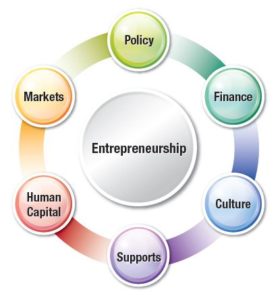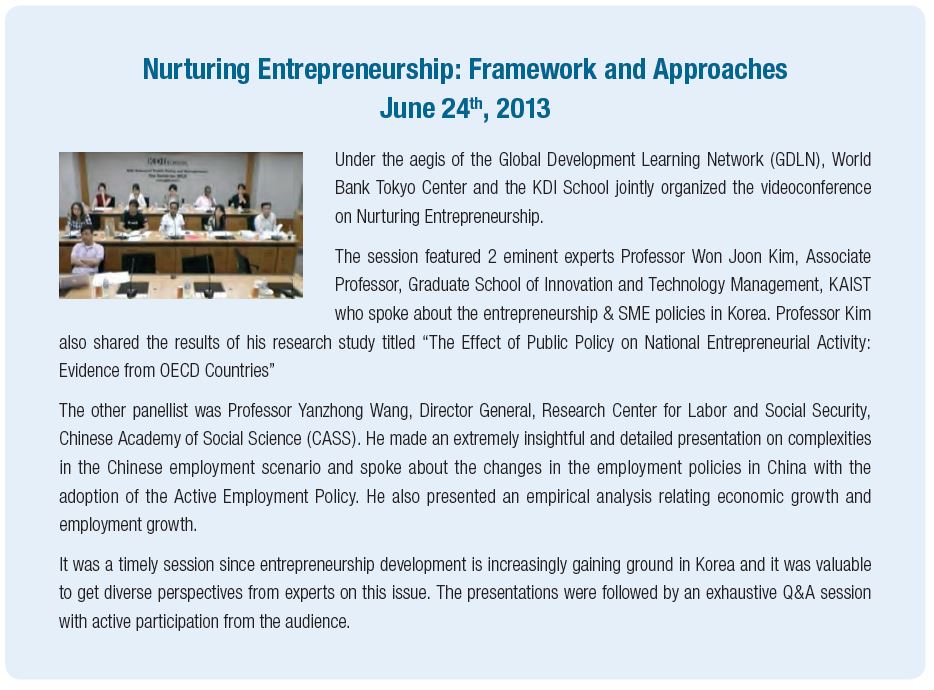
The Entrepreneurial imperative for Korea
- Date 2013-08-01 09:04
- CategoryResearch and Education
- Hit1434
Building a Case for a Stronger Korean Entrepreneurship Ecosystem
The twin problems of an overqualified workforce and the heavy dependence of the economy on family-owned conglomerates are high among the critical issues that threaten the sustainable growth of the Korean economy. Time has come for Korea to recognize and act on the entrepreneurial imperative – to inculcate an entrepreneurial outlook among the young population.
Recent Trends
By conventional statistics, youth unemployment seems to be quite moderate in Korea: ‘only’ 9.6 percent of the ‘active’ youth labour force was unemployed compared to 21.4 percent in EU-27 in 2011. But the Korean case unusual. From the perspective of intergenerational risk sharing Korea’s youth unemployment rate is 4.6 times higher than the unemployment rate of adults aged 45 to 54. By contrast in Germany this figure is only 1.7.
In May 2013 International Labour Organization (ILO) released their Global Employment Trends for Youth report which outlines the employment environment for people aged 15 to 29 in nations around the world. Among the statistic were NEET rates among 34 OECD countries’ young people. NEET (Neither in Education, Employment, or Training) rate shows the percentage of youth who are not working or in school of any kind.
Korea has an alarmingly high NEET rate of 19 percent which means roughly 1 among 5 young people is unemployed.
The Solution & Policy Interventions
Some say that one potential solution is to invest in the creation of an ecosystem for entrepreneurship development.
What are the components of an entrepreneurship ecosystem? According to Babson College, such an ecosystem is formed by the interaction of financial capital, culture of risk taking, human networks that support mentoring, educational institutions that impart relevant skills and markets that reward innovation etc.
One of the key elements of such an ecosystem is entrepreneurship education at the undergraduate and graduate level. In Korea the focus on entrepreneurship education is fairly recent and is mainly driven by the University Entrepreneurship Centres established with support from the Ministry of Education & Small & Medium Business Administration (SMBA).
In Korea there are 2 specific challenges that hinder the development of entrepreneurship education: the lack of common framework that defines a national curriculum for Entrepreneurship Education and lack of data and evaluation methodologies that can effectively measure the impact of entrepreneurship education of future career paths of young graduates.
The Brighter Side and Future Outlook
While major efforts are needed to bolster the entrepreneurship ecosystem in Korea, there is progress being made. So what’s the good news?
 The number of Korean startups has nearly doubled to 28,193 in 2012 from just 15,401 in 2008. While these numbers cannot be evaluated in isolation i.e. in the absence of the 1-3 year survival rates for new startups, they still show commendable growth for startups.
The number of Korean startups has nearly doubled to 28,193 in 2012 from just 15,401 in 2008. While these numbers cannot be evaluated in isolation i.e. in the absence of the 1-3 year survival rates for new startups, they still show commendable growth for startups.- In Korea, venture capital firms raised $191 million in the first quarter of 2013, up slightly from $189 million a year earlier, according to the Korean Venture Capital Association. In contrast, data from the National Venture Capital Association shows slowdown in the US. U.S. venture capital firms raised $4.1 billion from 35 funds during the first quarter of this year – a 34% decline from a year earlier and the slowest quarter for venture capital fundraising since the third quarter of 2003
- An even more interesting trend is that successful startup founders such Kim Bum-su of Kakao Talk are now reinvesting in young startups. Kakao has teamed up with the South Korean government to launch a KRW30 billion ($27 million) fund aimed at supporting start-ups. The Small & Medium Business Administration (SMBA) will back the Kakao Young Entrepreneur Fund.
- The government has also offered support by unleashing $2.9 billion in funding for tech venture startups. President Park’s initiatives to develop the country thru diversification (as opposed to depending on manufacturing) will take the form of subsidize loans and state funded investments in new startup companies.

By Manish Joshi (2012 MPP, India)
Related News
-
Research and Education6 days ago
Republic of Korea Economic Bulletin, May 2024#KDI #Economic #KDISCHOOL #kdischool #Economic Bulletin #Research
-
Research and Education34 days ago
Republic of Korea Economic Bulletin, April 2024#KDI #Economic #KDISCHOOL #kdischool #Economic Bulletin #Research
-
Research and Education62 days ago
Republic of Korea Economic Bulletin, March 2024#KDI #Economic #KDISCHOOL #kdischool #Economic Bulletin #Research
